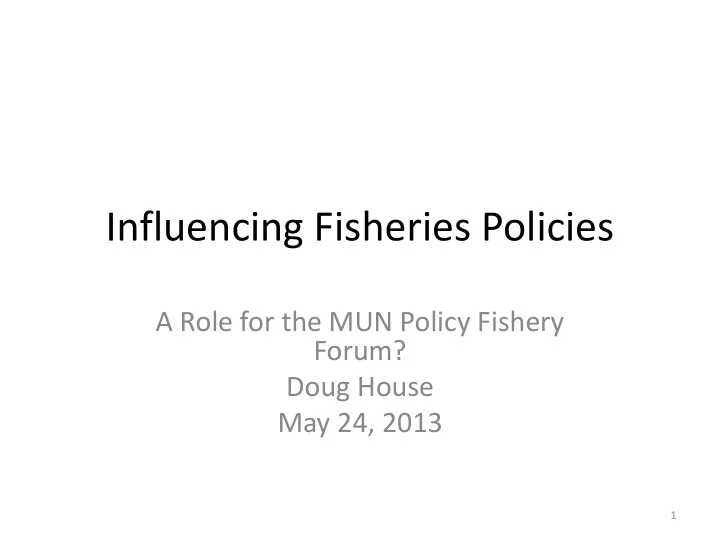

Influencing Fisheries Policies A Role for the MUN Policy Fishery Forum? Doug House May 24, 2013 1
Where are Fisheries Policy Decisions Made? • Federal Cabinet, especially Prime Minister and Minister of Fisheries and Oceans—offshore, harvesting, interprovincial and international trade. • Provincial Cabinet, especially Premier and Minister of Fisheries and Aquaculture—onshore, processing • This is where decision-making POWER is exercised • But what and who INFLUENCES the decision- makers? 2
Influences on Fisheries Policies • Many, various and changing over time • Ideology/political philosophy of ruling party • Fisheries economists and fisheries scientists (stronger at federal level) • Sociologists, social anthropologists and community economic developers (stronger at provincial level) 3
Influences on Fisheries Policies (cont.) • Interest groups e.g. FFAWU, SPNL, environmental groups—often conflicting • Constituents, media, public • Commissions and task forces—e.g. Kirby Task Force in early 1980s • Party platforms—e.g. 2003 Blue Book • Government strategic plans—e.g. Managing All Our Resources (Peckford, 1979); Change and Challenge (Wells, 1992) 4
Issue for this group: How to insert itself in this process? Fisheries Policies in Historical Context 5
Confederation and the Birth of Current Fisheries Policies System • Surprisingly little attention in National Convention and Terms of Union • More concerned with short-term fiscal challenges than long-term fisheries development • Striking ease with which assimilated into federal Department of Fisheries 6
Did Smallwood (1949-1972) “Neglect the Fisheries?” • Industrialization: from flakes to fish plants (salted to frozen) • Resettlement and consolidation (“burn your boats”) • BUT: genuine effort towards a national fisheries policy and programs—minimal success, notably Salt Fish Corporation (Aidan Maloney) • Fisherperson’s UI/EI—1956(?), integral part of rural economy • Opening of Fisheries College in 1963 7
Frank Moores and Brian Peckford: “’Controlling All Our Resources” • Moores (1972-1979): super ports? • 1977: 200-mile limit and expansion of capacity • Peckford (1979-1989): sought balance between offshore and inshore—preserve the latter • Lobby for Joint Management Board (modelled on C- NLOPB)—rejected by federal government (fish swim) • Important difference between policy formation and policy implementation • Royal Commission on Employment and Unemployment—Joint Policy Board? 8
Kirby Task Force and Fisheries Restructuring • Promise of 200-mile limit (1978) • Exaggerated expectations of northern cod stock growth and subsequent overcapacity • Fisheries crisis of early 1980s • Fishery Restructuring Agreement (1983) • Creation of National Sea and Fishery Products International • FPI: sensitive development during 1980s but miscalculated stocks growth 9
Crisis Management in 1990s • Pre-moratoria crisis: Dave Vardy and Ken Stein chair provincial and federal task forces • Les Harris report • Moratoria • TAGS and NCARP • Successful diversification of species— positive* • But undermining of equilibrium of rural economy: fish harvesting, fish processing, subsistence production, EI/make-work, non-fisheries work 10
Wells and Tobin • Wells more of a federalist, but broke with Mulroney over Meech Lake—negative repercussions for coordinated development • Crisis management precluded much else • Diversification within and outside the fisheries (Economic Recovery Commission—New Opportunities for Growth) • Tobin: increase in shrimp licenses to compensate for cod failure exacerbated overcapacity 11
Danny Williams and Fisheries • Loss of FPI (Crosbie and Trepassey; Williams and Young) • Increased provincial support for fisheries science • Significant growth in aquaculture industry (Trevor Taylor column re-Connaigre Peninsula) • Failure of crab sharing plan: Trevor Taylor (harvesters opposed) • Failure of joint marketing proposal: Williams (processers opposed) • Failure of MOU: Tom Clift 12
Recent Policy Issues: Dunderdale and Harper • Harper government neo-liberal challenges (laissez-faire by design): EI reforms, review of fleet separation policy • Dunderdale: more laissez-faire by default; deal with the fall-out • Lack of a coherent fisheries policy for either NL or for Canada as a whole 13
What Can We Do? • Out of the Ivory Tower and into the Political Arena?—different thinking: strategies and tactics • Major challenge—consensus among ourselves about what needs to be done • Maybe agree on a framework? • Assuming achieved: need a concise, well- articulated document (manifesto?) in plain language 14
What Can We Do? (cont.) • Lobbying campaign at both federal and provincial levels • Ministers, deputies, premier • Opposition parties • Election platforms • Influential groups e.g. Strategic Partnership, Business Coalition • Media • Need professional help to design and implement a strategy and tactics 15
A Different Kind of Challenge • Do we want to go there? i.e. this Forum • Would we need support of MUN President, senior executive and Board of Regents? • Or—continue as a forum for education, information exchange and dialogue? • Leave it to members separately or others to work to influence government policy? • Maybe aim to influence the influencers? 16
Recommend
More recommend